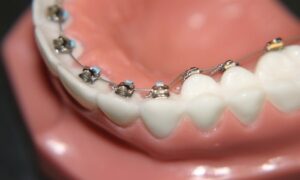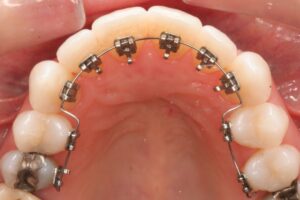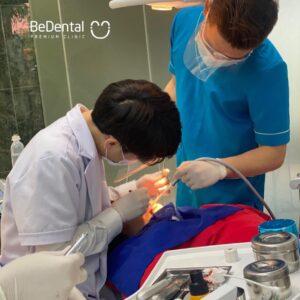LINGUAL BRACES
Lingual braces and what you need to know ?
Are Lingual braces better than traditional braces? Can I wear a lingual brace? Orthodontics is a way to treat misaligned teeth, overbite, underbite,etc. It is becoming more and more popular, however, many people still hesitate because of aesthetics when wearing braces. To overcome this disadvantage, lingual braces were invented. Let’s find out in this article!
What is lingual brace ?
When it comes to braces, most people think of an unsightly set of iron-filled teeth. Fortunately, the advancement of orthodontic technology has led to the emergence of lingual braces. Lingual braces have the same components as conventional braces, but they’re fixed to the back of your teeth, on the tongue – or lingual – side of the teeth. Because they’re behind your teeth, they’re nearly invisible, help to increase the aesthetics and help people more confident when communicating.

The method of braces on the side of the teeth can be used for everyone, from kids to adults. It also can be used for overbite, misaligned teeth,uneven teeth.
- Overbite: Overbite or retrognathism is a popular malocclusion type. It is easy to see that the upper jaw and teeth severely overlap the bottom jaw and teeth, leading to an uneven face, less aesthetic. You can use lingual brace to solve the problem of protruding teeth, ensure the correct bite, and eat easier.
- Underbite: Underbite or prognathism. With normal bite, the upper teeth fit slightly over lower teeth and the points of molars fit the grooves of the opposite molars but in people who have underbite, the lower jaw protrudes or juts forward, causing the lower jaw and teeth to overlap the upper jaw and teeth. Braces are attached to the inside of the teeth to help straighten the upper and lower jaw evenly, bite properly, and improve the bad condition of the teeth.
- Diastema: Diastema or gap-toothed, gaps can occur anywhere in your mouth, but they’re most common between your two front teeth. This condition is usually a cosmetic concern, but sometimes, it’s related to gum disease. Lingual braces facilitate intervention and approximate the distal teeth to ensure cosmetic, bite and chewing function.
Advantages:

Lingual braces are an advanced method compared with traditional braces. There are some great advantages, such as:
- Cosmetic: Archwire is attached behind the teeth so basically, lingual braces are virtually invisible, other people can’t see them unless you open your mouth wide. It helps people in the brace process feel more comfortable, confident when interacting face-to-face. For people who have to appear in front of a crowd or work in the media industry, MC,etc, this is definitely an appropriate method.
- Possibly less pain: During the process of wearing braces, the outer surface of the brackets is scratched with the oral mucosa, which can cause inevitable canker sore in the mouth due to the friction of the objects. There are many cases of cheek wounds due to over exercise. When using braces on the outside, it is easy to hurt the lips and cheeks when they collide. So using an internal bracket can save you from this
- Preventing dental diseases: when removing braces, you can face some issues like tooth decay, white spots appear on the surface of the teeth… If the braces are on the tongue, the outside of the teeth will be kept intact, you don’t need to worry about it affect aesthetics
See more: Ceramic braces
Disadvantages
- The cost of lingual braces may be higher than that of other varieties.
- They may make you feel really uncomfortable, especially at initially.
- They might cause you to lisp momentarily.
- They might require more time than traditional braces.
Are you a good candidate for lingual braces?
Are lingual braces more uncomfortable than other braces?
Because lingual braces are attached to the back of the teeth, where the tongue can become irritated, they can be more unpleasant than other forms of braces and may take some time to get used to. Although the discomfort can be addressed with orthodontic wax or other treatments recommended by the orthodontist, it normally goes away after the initial adjustment phase.
It’s crucial to share any discomfort worries with your orthodontist, who can advise you on how to handle any discomfort and assist in establishing whether lingual braces are a good option for you.
Do lingual braces take longer than regular braces?
Typically, lingual braces may take a bit longer to complete treatment than traditional braces because they are more difficult to adjust and require more precise placement. However, the actual length of treatment will depend on individual cases and the severity of the orthodontic issues being addressed.
In some cases, lingual braces may actually achieve results more quickly than traditional braces due to their ability to exert more precise control over tooth movement. Ultimately, the length of treatment for lingual braces will vary depending on the individual patient and their orthodontic needs.
Do lingual braces affect your speech?
Lingual braces, which are placed on the back of the teeth, can initially affect speech. The tongue may need time to adjust to the new appliance and may cause a temporary lisp or difficulty pronouncing certain words. However, with practice and time, most patients are able to speak normally with lingual braces. In some cases, the orthodontist may need to make adjustments to the braces to alleviate any speech difficulties. Overall, the impact on speech is typically temporary and minimal.
Cost of lingual braces compared to other options
Lingual braces can be more expensive than traditional braces due to their customized nature and the additional time and effort required for installation and adjustment. The cost of lingual braces can vary depending on several factors, including the complexity of the case, the duration of treatment, and the location of the orthodontist.
On average, the cost of lingual braces can range from $8,000 to $13,000, while traditional braces typically cost between $3,000 to $7,000. Invisalign, a clear aligner alternative to braces, can also be more affordable than lingual braces, with costs ranging from $3,000 to $8,000.
What can you eat with lingual braces?
When you have lingual braces, it’s important to be mindful of the foods you eat to avoid damaging the braces or causing discomfort. Here are some suggestions for foods that are safe to eat with lingual braces:
- Soft foods: Foods that are soft and easy to chew, like mashed potatoes, steamed vegetables, and tender meats, are a good option.
- Cooked vegetables: Cooked vegetables are easier to chew than raw vegetables, so they are a good option with lingual braces.
- Dairy products: Soft cheeses, yogurt, and milk-based drinks are safe to consume with lingual braces.
- Smoothies: Smoothies are a good option because they are easy to drink and can be packed with nutrients.
- Soft fruits: Fruits like bananas, ripe peaches, and berries are soft enough to eat with lingual braces.
- Carbohydrates: Cooked pasta, rice, and bread are all safe to eat with lingual braces.
It’s important to avoid hard, crunchy, or sticky foods that can damage the braces or get stuck in them. This includes things like popcorn, nuts, hard candies, and chewy candies. It’s also a good idea to avoid foods that are high in sugar, as they can contribute to tooth decay
Cleaning problems:
It could be more challenging to keep up with your oral hygiene if you have lingual braces. Your lingual braces’ brackets could become stuck with food fragments. The lingual brackets are placed closer together than the labial brackets. You can get rid of any sticky food by using a water flosser.
To properly clean lingual braces, patients should use interdental brushes, floss threaders, and a water flosser to reach between the brackets and wires. Regular dental check-ups and cleanings are also essential to prevent any potential dental problems from developing.
If cleaning and maintenance become too challenging, patients may consider other orthodontic options that are easier to clean, such as clear aligners. It’s important to discuss all options with an orthodontist to determine the best choice for individual needs and goals.
Where can you get the service ?
Bedental is a pioneer in in-depth research on lingual braces. Our doctors focus on researching braces, updating the latest methods of braces, helping to shorten treatment time and bring high efficiency to customers.

With the best dental professionals in Vietnam, BeDental is a popular address for providing dental services and a leader of the dentistry field with the support of advanced technology. Bedental confidently commits to help you have a beautiful, bright smile.
Referring our prices of BeDental at here
BEDENTAL - TOP STANDARD DENTISTRY SYSTEM
In HANOI
Address 1: 7B Thi Sach St, Ngo Thi Nham, Hai Ba Trung Dist, Ha Noi. - 0934.61.9090
Address 2: 343 Tay Son St, Nga Tu So Ward, Dong Da Dist, Ha Noi. (Nga Tu So Cross) - 0934.61.9090
Address 3: CC2 Tower Nguyen Huu Tho St, Dinh Cong Ward, Hoang Mai Dist, Ha Noi. (Inside True Hope ) - 0934.61.9090
In HO CHI MINH
Address 1: 53 -55 -57 Pho Duc Chinh St, Nguyen Thai Binh, Dist. 1, Ho Chi Minh. - 0766.00.8080
Address2: 25, City Land urban area, Go Vap Dist, Ho Chi Minh - 0766.00.8080
Working: 9am - 6pm everyday
Website: https://bedental.vn/en/
HƯỚNG DẪN ĐI KHÁM TẠI BỆNH VIỆN RĂNG HÀM MẶT TRUNG ƯƠNG NĂM 2023




